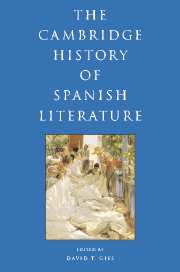Book contents
- Frontmatter
- I INTRODUCTION
- II HISTORY AND CANONICITY
- III THE MEDIEVAL PERIOD
- 2 Medieval Spanish literature in the twenty-first century
- 3 Beginnings
- 4 The poetry of medieval Spain
- 5 Medieval Spanish prose
- 6 The medieval theatre: between scriptura and theatrica
- IV EARLY MODERN SPAIN: RENAISSANCE AND BAROQUE
- V THE ENLIGHTENMENT AND NEOCLASSICISM
- VI THE FORGING OF A NATION: THE NINETEENTH CENTURY
- VII THE MODERN, MODERNISMO, AND THE TURN OF THE CENTURY
- VIII TWENTIETH-CENTURY SPAIN AND THE CIVIL WAR
- IX IN AND OUT OF FRANCO SPAIN
- X POST-FRANCO SPANISH LITERATURE AND FILM
- Bibliography
- Index
- References
2 - Medieval Spanish literature in the twenty-first century
from III - THE MEDIEVAL PERIOD
Published online by Cambridge University Press: 28 March 2008
- Frontmatter
- I INTRODUCTION
- II HISTORY AND CANONICITY
- III THE MEDIEVAL PERIOD
- 2 Medieval Spanish literature in the twenty-first century
- 3 Beginnings
- 4 The poetry of medieval Spain
- 5 Medieval Spanish prose
- 6 The medieval theatre: between scriptura and theatrica
- IV EARLY MODERN SPAIN: RENAISSANCE AND BAROQUE
- V THE ENLIGHTENMENT AND NEOCLASSICISM
- VI THE FORGING OF A NATION: THE NINETEENTH CENTURY
- VII THE MODERN, MODERNISMO, AND THE TURN OF THE CENTURY
- VIII TWENTIETH-CENTURY SPAIN AND THE CIVIL WAR
- IX IN AND OUT OF FRANCO SPAIN
- X POST-FRANCO SPANISH LITERATURE AND FILM
- Bibliography
- Index
- References
Summary
Medieval Spanish literature is changing rapidly. The end of the Franco regime and Spain’s membership in the European Union have transformed the Spanish nation, giving new life to cultural diversity within Spain at the same time that economic and even political differences among the nation-states of Western Europe have been renegotiated in view of common European goals. Transnational corporations and global movements of large populations have changed the way we think of centers of power and the ethnic composition of “peoples.” The old European order of monolingual and monocultural nation-states has been rocked to its foundations and, to a significant extent, those foundations rested upon a particular way of conceiving the European Middle Ages. The Middle Ages provided the early evidence of the language, literature and the “soul” of the people who would create the modern nation-state. This evidence then served, in a rather circular way, to confirm the naturalness of the nation-state as the inevitable outcome of historical forces in place for centuries if not millennia. The Middle Ages legitimized the modern nation-state. Such a view is obviously reductive, not to mention teleological. It must focus on those aspects of the Middle Ages which can be made to predict the cultural, political, ethnic, and linguistic unity which constitute the founding myth of modern European nations.
In this era of pan-European union and regional autonomous governments within Spain, however, the destiny of the order of nation-states seems much less manifest than it was thirty years ago. If this destiny has changed then it is also time for us to re-examine with a critical eye the foundational narratives of that destiny, including the stories we tell about the history of something we have called “medieval Spanish literature.”
- Type
- Chapter
- Information
- The Cambridge History of Spanish Literature , pp. 37 - 57Publisher: Cambridge University PressPrint publication year: 2005
References
- 1
- Cited by



